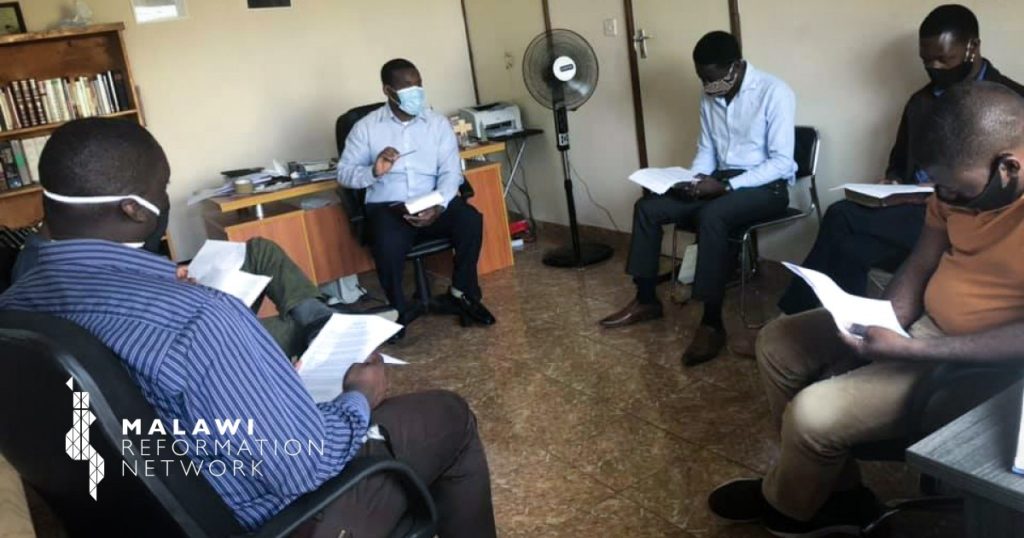In his recent article (August 27, 2020) “Ministering in Malawi in the Midst of COVID-19,” Malawi Reformation Network (MRN) founder Rev. Confex Makhalira describes several examples of innovative new outreach initiatives by MRN’s Blantyre-based Christ Presbyterian Church plant which the Lord has blessed to “share God’s word and show the love of Christ to the fearful, anxious, and needy.”

The past six months of pandemic-impacted MRN outreach ministry have differed markedly from the “norms” any of us had previously anticipated. The innovative response to COVID-19 constraints freshly reflects the robust adaptability of indigenous local outreach which can adjust to extraordinary disruptions.
The innovative response to COVID-19 constraints freshly reflects the robust adaptability of indigenous local outreach which can adjust to extraordinary disruptions.Tweet itThis year’s unprecedented restrictions on global travel (for MRN, divinity students and training partners between North America and Malawi) has forced MRN to alter many planned activities. This perseverance is providentially facilitated by the continuing availability of modern telecommunications. For local congregations including CPC and others, virtual gatherings and gospel broadcasts have helped to alleviate the temporary disruption of traditional in-person gatherings. Globally, Zoom meetings have enabled MRN to maintain regular contact among our North American partners and indigenous church leaders in Malawi. The availability of distance learning is a welcome supplement for new divinity students under MRN’s supervision.
The enduring viability of MRN’s partnership between North American and Malawi-based church leaders is a reflection (in part) of the gospel’s unique transcendence across time and space. As British missions historian Andrew Walls asserted in his 1981 essay “The Gospel as the Prisoner and Liberator of Culture,” two opposing tendencies underlie all of Christian history. Both are firmly rooted in the gospel itself:
- The Indigenizing Principle – “The impossibility of separating an individual from his social relationships and thus from his society leads to one unvarying feature in Christian history: the desire to ‘indigenize,’ to live as a Christian and yet as a member of one’s own society.”1 Every person is deeply shaped by his/her historical and cultural context. Perceiving reality independent of those is no less challenging than a passenger trying to physically lift up a vehicle in which s/he is riding.
- The Pilgrim Principle – “…whispers to the Christian that he has no abiding city and warns him that to be faithful to Christ will put him out of step with his own society. The Christian is given an adoptive past. He is linked to the people of God in all generations, and most strangely of all, to the whole history of Israel. The Church in every land, of whatever race and type of society, has this same adoptive past by which it needs to interpret the fundamentals of the faith.”
Ideally, every faithful church should understand itself to be an (earthly) embassy of a faraway (heavenly) kingdom. Each congregation exists to faithfully represent the Kingdom of Heaven within the earthly community into which it’s planted. If it fails to meaningfully interact with its surroundings, its impact on those outside its walls will be minimal. If its message is unintelligible to the unchurched people who surround it, how can its witness be comprehended? Much less adopted?
By providing Reformed theological education, MRN seeks to deepen Biblical understanding and commitment in line with Walls’ Pilgrim Principle. By providing hands-on pastoral training, MRN strives to equip Malawian men to faithfully embody Walls’ Indigenizing Principle to enhance the planting of confessional Reformed churches in their unique and ever-changing cultural context.
By providing Reformed theological education, MRN seeks to deepen Biblical understanding and commitmentTweet itOngoing interactions between believers and congregations who share the same Reformed confessional heritage (Pilgrim Principle) in diverse cultural contexts (North America, Malawi), can serve as a foretaste of what Walls describes as “the great multitude whom no man can number out of every nation and tribe and people and tongue. Never before, has there been so much potential for mutual enrichment and self-criticism, as God causes yet more light and truth to break forth from His Word.”2
1 Andrew F. Walls: “The Gospel as the Prisoner and Liberator of Culture” (1981) included in “The Missionary Movement in Christian History: Studies in the Transmission of Faith” (1996) Orbis Books, Maryknoll, New York 10545, U.S.A.
2 Andrew F. Walls: “Mission Focus – Current Issues” (Herald Press, 1980).

Lee DeYoung
MRN Board Member